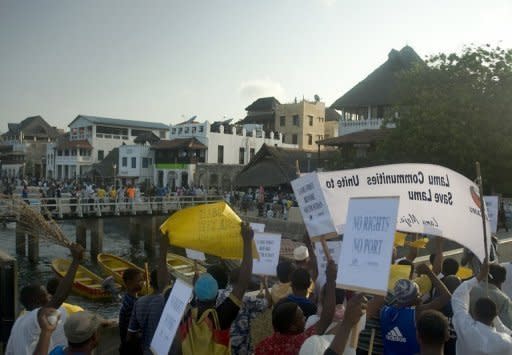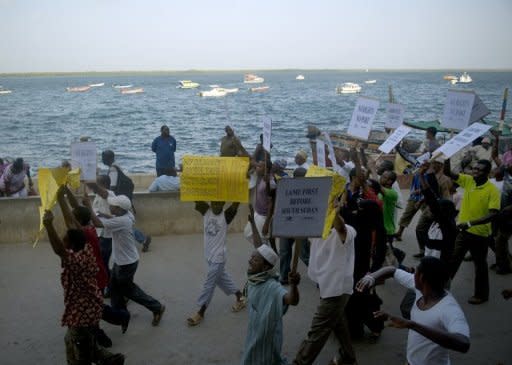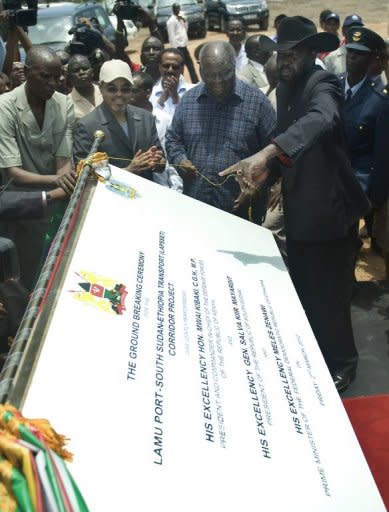Kenya launches 18.5bn euro port project
Kenya launched the construction of a massive port, railway and refinery Friday near a UNESCO-listed Indian Ocean island in a project it bills as the biggest ever in an African nation. Kenyan President Mwai Kibaki, Ethiopian Prime Minister Meles Zenawi and South Sudanese President Salva Kiir unveiled a plaque in a ceremony to mark the official start of building work near Lamu island in Kenya's southeast. "I have no doubt that this day will go down in history as one of the defining moments, when we made a major stride to connect our people to the many socio-economic opportunities that lie ahead," Kibaki said. The project will provide the "landlocked countries of our region with a direct and dependable route to the sea" and help connect "the entire east and central African region to international markets," he added. Nairobi hopes the $24.5 billion (18.5-billion-euro) scheme will turn the east African country into a regional economic hub and propel it to become a middle-income economy in the next two decades. Dancers and singers marked the formal start of construction at the inauguration at the Indian Ocean shore where pristine mangrove forest is already being chopped down and cleared. The port to be constructed with 32 berths and be connected to Ethiopia and oil-rich South Sudan by a super-highway, a railway and a pipeline to export Juba's crude. "We look forward to extend our full cooperation to make sure that this project is brought to full fruition," said Meles, calling the launch an "historic event." The project is expected to be funded by regional financial institutions, governments and international lenders, with China believed to have a major stake. Kibaki, in a speech thanking organisations including the World Bank, African Development Bank and African Union, singled out China as being "extremely supportive" of the project. Kenya is already the regional economic powerhouse, but argues its existing main transport corridor -- built 100 years ago by British settlers -- was no longer spurring more development. However, Lamu residents protest that the huge port, although located some 10 kilometres (six miles) from the UNESCO-listed island, will impact on their livelihoods and accuse the government of ignoring their concerns. "The demands for the rights of Lamu people have fallen on deaf ears," said a statement by Save Lamu, a coalition of local community groups in Lamu. "We are greatly concerned that the lack of transparency, secrecy and poor accountability in the way the project is being implemented is a dismal reflection of our rights as governed by the constitution," it added. Kibaki said precautions must be taken to ensure there is "minimal interference with the delicate ecosystem and cultural heritage." However, conservationists fear that monster earth movers and dredgers will destroy the mangroves and plough ship channels through coral reefs that are crucial fish breeding grounds. South Sudan's Kiir said his country, locked in a furious row with neighbour and former foe Sudan, was looking to the Lamu port and its infrastructure to unleash it from dependence on only oil. "For South Sudan, it is a vision to long-term security. The backbone of our infrastructure that will allow us to end our reliance on oil extraction," said Kiir. "It is a vision whereby in the future you will be able to board people and freight cargo in the morning in Juba and be in Lamu that same afternoon." South Sudan has no pipeline or refinery and depended on Khartoum to export its oil. It has now shut down production accounting for 98 percent of its revenue in protest at Sudan's alleged confiscation of its crude. The huge project will however have to overcome the threat of bandits in northern Kenya, Al-Qaeda-allied Somali rebels operating dangerously close to Lamu on the other side of the border and pirates preying on the region's maritime traffic.




